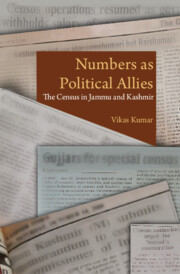6 - Growth as Well-Being
Published online by Cambridge University Press: 25 October 2023
Summary
India has fully protected the minority Muslims and has given them equal rights. The rapidly growing population of Muslims in India is a testimony to the fact that … minorities are flourishing here.
—J. P. Nadda, national working president, Bharatiya Janata Party (BJP) (Rajya Sabha 2019c: 543)Introduction
The quality of census data for Jammu and Kashmir (J&K) is circumscribed by uncertain weather, armed insurgency, forced migration, regional and communal polarisation, uneven accounting of armed forces, international conflicts, bureaucratic moral hazard, ineffective legal and administrative measures to check manipulation and changes in borders, reference dates, demarcation of snowbound territory and distribution of mobile population groups. Our ability to understand the impact of these factors on data quality is limited by the poor quality of metadata. It is, however, not clear why successive governments have failed to pay attention to the growing data deficit of J&K. Most recently, the anomalous headcounts of 2001 and 2011 did not prompt a closer scrutiny. We found that the over-reporting of children (Chapter 3) and an unusually large growth of the slum population (Chapter 4) in Kashmir account for several intertwined coverage errors in the reported population of the state. In this chapter, we will show that in 2011 the number of households was also inflated in Kashmir. These anomalies inflate the population shares of both Kashmir and Muslims, and the effect is compounded in the case of the latter by a very sharp rise in the population of Generic Tribes (Chapter 3). We found that conventional demographic and non-demographic factors cannot explain these anomalies and argued that in both 2001 and 2011 enumeration was affected by communal propaganda in Kashmir that fanned fears of demographic marginalisation. Chapters 4 and 5 discussed the political and legal–administrative contexts of the census. The present chapter relates the indifference of New Delhi towards anomalous population statistics of J&K to strong priors that suggest over-enumeration is unlikely, and that too in conflict zones, and to an older tendency to read population growth as a measure of well-being. It then discusses coverage and content errors in census data on Punjab and J&K. It argues that some of the major anomalies in the headcount of J&K are products of deliberate intervention rather than being mere aggregations of random errors at the grassroots.
- Type
- Chapter
- Information
- Numbers as Political AlliesThe Census in Jammu and Kashmir, pp. 358 - 390Publisher: Cambridge University PressPrint publication year: 2024



